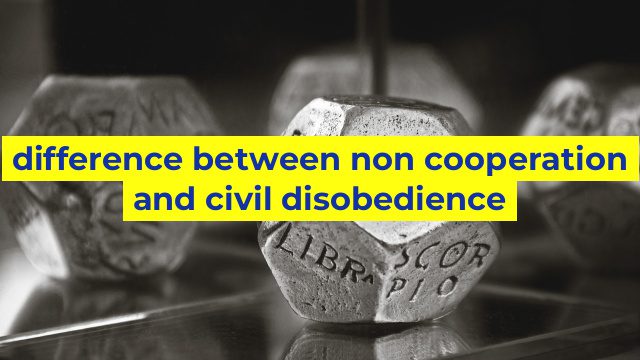Difference Between Non-Cooperation and Civil Disobedience
What is Non-Cooperation?
Non-cooperation usually refers to a peaceful form of protest or resistance, where individuals or groups refuse to comply with certain laws or policies they feel are unjust or immoral. Non-cooperation can take numerous forms, such as boycotts, strikes, peaceful demonstrations, and civil disobedience. It is generally a passive and nonviolent way of protesting against the system without using aggression or violence.
Non-cooperation aims to expose the problems of the system and draw attention to them, forcing the authorities to address the matter. This form of resistance can be effective in the long run, as it challenges the legitimacy of the government and can lead to social and political changes.
What is Civil Disobedience?
Civil disobedience also involves a peaceful form of protest or resistance, but it is characterized by the deliberate breaking of laws or regulations considered unjust, in order to call attention to an issue or cause. Civil disobedience can take different forms, such as sit-ins, strikes or rallies, and is often accompanied by a willingness to face arrest or imprisonment.
Civil disobedience is a more active and confrontational form of protest than non-cooperation. Its aim is to create enough disruption to the normal functioning of the system to bring attention to the issue, and to pressurize the government to act on it. Civil disobedience is often seen as an act of conscience, and as such can inspire solidarity among like-minded groups or communities.
Key Differences Between Non-Cooperation and Civil Disobedience
The main differences between non-cooperation and civil disobedience are the methods used and the degree of willingness to break the law. Non-cooperation is generally passive and peaceful, while civil disobedience can be more active and confrontational. Civil disobedience involves breaking the law, while non-cooperation is more focused on the refusal to follow certain policies or laws.
Another difference is the level of resistance to the system. Non-cooperation is often seen as a way of working with the system to bring about change, while civil disobedience is seen as opposing the system entirely. Civil disobedience can be seen as a form of resistance, whereas non-cooperation can be considered a form of non-violent protest.
Finally, non-cooperation is often used to draw attention to issues and can take longer before changes are made. Civil disobedience, on the other hand, can bring about changes more quickly, as it demands more direct action and confrontation of the authorities.
In conclusion, while non-cooperation and civil disobedience share a commitment to social change, the methods and goals of these two forms of resistance are different. Non-cooperation is more passive and peaceful, and aims to bring about change through peaceful means, while civil disobedience is more active and confrontational and involves breaking the law to force the authorities to address an issue.
Table difference between non cooperation and civil disobedience
| Non-cooperation | Civil disobedience |
|---|---|
| Non-participation in unjust laws or institutions through peaceful means. | Intentional violation of unjust laws or institutions through peaceful means. |
| May include social ostracism, boycotts, and nonpayment of taxes. | May include sit-ins, strikes, and acts of civil disobedience. |
| Focused on withdrawing consent and support for unjust laws or institutions. | Focused on exposing and challenging unjust laws or institutions through direct action. |
| Tactic used by Gandhi during the Indian independence movement. | Tactic used by Gandhi during the Salt Satyagraha and other campaigns. |


